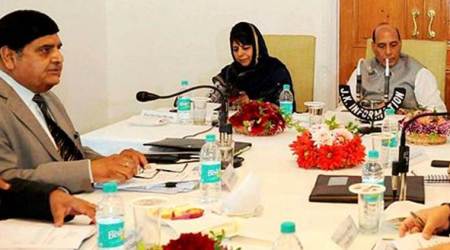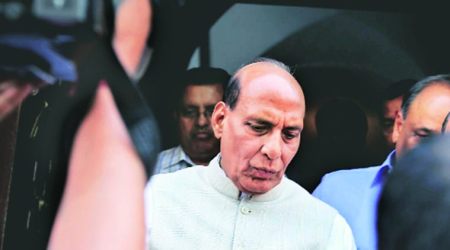 Home Minister Rajnath Singh holding review meeting with J&K CM Mehbooba Mufti in the state. (Source: PTI)
Home Minister Rajnath Singh holding review meeting with J&K CM Mehbooba Mufti in the state. (Source: PTI)
Spelling out a “permanent solution” to the Kashmir issue based on “five Cs”, Union Home Minister Rajnath Singh assured the Valley Monday on the legal challenge to Article 35-A that the Centre would not do anything that goes against the sentiments of the people of Jammu and Kashmir.
“When we spoke of a permanent solution (to the Kashmir issue), many assumptions were made. What does this permanent solution mean? I want to tell you. Our permanent solution is based on five Cs — compassion, communication, co-existence, confidence-building and consistency,” Singh told a press conference in Srinagar, less than a month after Prime Minister Narendra Modi, in his Independence Day address to the nation, said the problems in the Valley cannot be resolved through “gaali” (abuse) or “goli” (bullets) and change can only come by embracing Kashmiris.
Singh said: “Our effort is that the people of Jammu and Kashmir should get honour and dignity together with peace. We will work for that.”
Asked about the central government’s stand on the special constitutional position of Jammu and Kashmir and the controversy surrounding Article 35-A, Singh said a non-issue was being made an issue.
“I understand there is no scope for doubt or suspicion. Nowhere has the central government initiated anything with regard to this issue. We have not gone to court. I am not talking only about Article 35-A. Whatever we do, whatever our government does, we will not do anything against the sentiments of the people here. We will respect them.”
At the press conference, Singh was flanked by Jitendra Singh, Minister of State in the Prime Minister’s Office, and Nirmal Singh, Deputy Chief Minister and BJP leader of J&K.
Responding to his remarks, Omar Abdullah, leader of the Opposition National Conference, said on Twitter: “This is a very important statement from the Union Home Minister. His assurance will go a long way towards silencing the noises against 35-A. The Union government must now file a counter affidavit in the Supreme Court to defend 35-A. That is the way to carry this assurance forward.”
Singh said he had come to the Valley with an “open heart” and the government was always ready to talk to anyone. Asked whether the government was ready to talk to the separatist leadership, he said: “Jab jab mein aaya hoon, dil khol kar aaya hoon, dimaag khol kar aaya hoon. Mein ne kaha, sab se baat karna chahta hoon, baat karne wale log toh aane chahiyein (Whenever I have come here, I have come with an open heart, open mind. I said I want to speak to everyone. People who have to talk should step forward),” he said.
“Yeh koi nahin keh sakta ki hum ne mana kiya. Mein ne aap se pehle bhi kaha, jitney bhi stakeholders hain, jo bhi mujh say baat karna chahate hain, mein sabhi se baat karunga. Mein kitni baar kahoon, kin alfaaz mein kahoon (Nobody can say we have refused to talk. I have said earlier as well, we are ready to talk to all stakeholders. Whosoever wants to talk, I will talk to him. How many times do I repeat it? In what words should I say it?).”
Singh said he had told the state government and security agencies not to be harsh with minors arrested for stone-pelting. “At the security review meeting, I told them, that small children, those under 18 years… many of them would have committed a crime, a mistake, come under somebody’s influence. But they should not be treated like criminals. Whatever action you have to take against them should be under the Juvenile Act. I also appeal to the stone-pelting youth to stay away from it.”
He said the situation in the Valley had improved but underlined that anti-militancy operations would continue. “The situation is far better than earlier. Conditions are improving everyday. I will not claim that the situation is under control but I will say with confidence that these are getting better. Militants will not be welcomed. Whosoever is a militant, a terrorist, he will get a befitting response,” he said.
On resumption of the dialogue process with Pakistan, Singh said Islamabad had not responded positively to Indian gestures. “Let me remind you of May 26 (2014). When there was the oath-taking ceremony of our Prime Minister and his government, we invited premiers of all neighbouring countries. The intent was clear. We did not invite them to shake hands but to join hearts. You also saw that our Prime Minister, breaking all protocols, went to attend a function of their (Pakistan’s) Prime Minister. We tried our best,” he said.
“But what has been the neighbour doing? He is infiltrating terrorists. I want to tell Pakistan to stop infiltration. We have not said ever that we don’t want good relations with our neighbour. Whether it was Atal Bihari Vajpayeeji or our Prime Minister Narendraji Modi, we took the initiative. But the way Pakistan should have responded, have they?” he asked.

